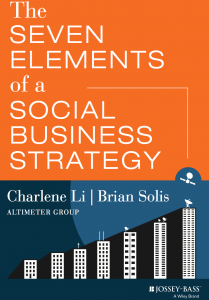Or maybe it’s exactly what you think. The problem of having the same name for two quite different definitions can be confusing. Doing a search of “Social Business in Europe” shows you exactly what I mean.
 You can’t see the forest through the trees. As a tried and true metaphor, it explains my point exactly. In an earlier post I described both versions, and the relation between the two, and you’ll see one variation gets completely overgrown by the other.
You can’t see the forest through the trees. As a tried and true metaphor, it explains my point exactly. In an earlier post I described both versions, and the relation between the two, and you’ll see one variation gets completely overgrown by the other.
When you search, and look around on the web, Social Business in Europe is predominantly about the Prof. Yunus definition of Social Business.
For me, as a Social Business professional this is a bit disconcerting. Because I follow Peter Kim’s definition of the term. I focus on the goings on within a company, how they communicate, how they share knowledge and engage with their employees, partners and customers.
In essence, I don’t care how they make a profit.
Why is this a problem?
Well, image some executive hears about Social Business in Europe. Some partner or even a competitor is very happy with their Social Business implementation. Having nice results because of it. Getting their Social Media under control, having proper on-line conversations and happy employees. All smiles, all around (it can happen).
Now this executive does the Google thing and is hard pressed to find anything related to what he heard during lunch.
What he does find is a lot of information on Social Business as depicted by Prof. Yunus.
OK, so why is that a problem?
Because this executive is going to abandon his search really quick when he finds out that according to Yunus’ definition of Social Business, his company needs to change the way it does business and needs to become socially responsible in a way that requires him to uproot his entire business process. Or at least part of it.
He’s not going to do that. And chances are, he won’t pursue the idea for some time. Missing out on the great benefits of having a Social Business according to Kim’s definition.
Now, I love the idea of Yunus’ Social Business, the concept is tantalising and the fact that the EU is picking this up is very promising. I do believe it’s a very important part of building a sustainable society.
However, not every company is ready for this, far from it, hardly any company is ready for this.
It is happening
A Google search on “Social Business in Europe” might lead you to believe we don’t practice Kim’s version of Social Business. The opposite is quite true. Rawn Shah did a write up following the Enterprise 2.0 Summit in Paris, earlier this year.
Rawn says:
Enterprise 2.0 and Social Business are reaching a stage of maturity in Europe with detailed cases from mid and large-sized organizations from a wide range of industries, headquartered in various European countries.
Even Microsoft Netherlands is doing a great job moving into the Social Business sphere.
The Difference
The difficulty lies in the different definitions of Social Business. Although both firmly rooted in “Social”, both have a very different impact on business. So much so, that a clear distinction has to be made when looking for a certain solution.
And let’s face it, most established companies will be looking for the Enterprise 2.0 version of Social Business.
Social Business in Europe
I know the two definitions are sticking. One comes from the US and is generating considerable traction. Books are written and businesses are build around the term.
The other comes from Bangladesh and, apparently, is getting momentum too, only on a different continent.
One is rooted in business and aims to create a more inspiring working environment leading to more streamlined and resilient company. The other a business which aims to create “new kind of capitalism that serves humanity’s most pressing needs”.
Quite a difference. Heck, Wikipedia doesn’t even recognize the first, they refer to Social Media.
Bottom line (literally), when you’re searching for a Social Business solution, make sure you get the right answers.


 Social Business is probably the best opportunity we have to create awareness and generate responsibility. People need to live more consciously, more awake. But, we’re missing the point and with that, a golden opportunity.
Social Business is probably the best opportunity we have to create awareness and generate responsibility. People need to live more consciously, more awake. But, we’re missing the point and with that, a golden opportunity.

